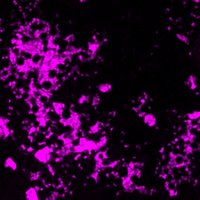 The immune system is the body’s most powerful weapon against diseases. So what if it were possible to use the immune system to fight cancer? For a long time now, researchers have been trying to do just that — for example, by employing a special kind of immune cell called
The immune system is the body’s most powerful weapon against diseases. So what if it were possible to use the immune system to fight cancer? For a long time now, researchers have been trying to do just that — for example, by employing a special kind of immune cell called
Good at fighting blood cancer, but not so effective against solid tumors
 Large solid tumors, on the other hand, sometimes pose big problems for
Large solid tumors, on the other hand, sometimes pose big problems for
The scientists working with Dr. Thomas Kammertöns, Prof. Thomas Blankenstein, Prof. Hans Schreiber and Christian Friese are searching for solutions with their research team at Charité — Universitätsmedizin Berlin, Max Delbrück Center for Molecular Medicine in the Helmholtz Association (MDC), Berlin Institute of Health (BIH) and the Einstein Foundation.
In a study published in the journal Nature, they investigated how the signaling molecules of
Blood vessel regression is induced
The researchers generated genetically modified mice and used a clinically relevant cancer model. This included animals in which only blood vessel cells were susceptible to the signaling molecule.
In this mouse model IFN-γ pruned back the blood vessels in the tumors, thus shutting down the supply of oxygen and nutrients and killing the tumors. The researchers were able to observe this process microscopically in living mice in fine detail. They found that the blood vessel cells alone responded to the signaling molecule. When the researchers targeted other types of cells with IFN-γ, the tumors continued their growth.
These findings provided an explanation for the molecule’s powerful properties, which were already well known. «IFN-γ is one of the most important weapons in the
Thomas Blankenstein, lead investigator of the study, says: «The two together — IFN-γ and tumor necrosis factor — are a powerful team. TNF bursts tumor blood vessels, thus opening up the tissue, while IFN-γ cuts off the blood supply and keeps the tumor at bay over the long term.»
Optimizing T-cell therapy
The study offered the researchers clues on how to improve
«Our findings are significant beyond tumor therapy," says Thomas Kammertöns. «Interestingly, the mechanism used by IFN-γ to eliminate solid tumors resembles the physiological regression of blood vessels during development. It also disrupts wound healing.»
«IFN-γ might also affect the formation of new blood vessels after strokes or heart attacks. That’s why we want to find out more about the molecular processes behind all of this.»
Source: https://www.mdc-berlin.de/47378513/en/news/2017/20170426-immuntherapie-gegen-Krebs


